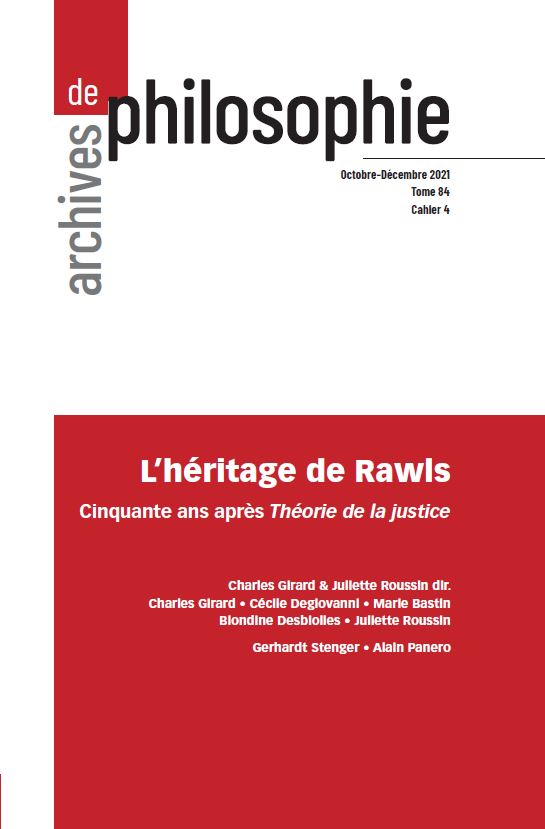 Volume 84, Issue 4, October-December 2021
Volume 84, Issue 4, October-December 2021
Rawls’s Legacy. Fifty years after A Theory of Justice
 Charles Girard & Juliette Roussin, L’héritage de Rawls. Cinquante ans après Théorie de la justice. Avant-propos
Charles Girard & Juliette Roussin, L’héritage de Rawls. Cinquante ans après Théorie de la justice. Avant-propos
Charles Girard, The conflict of liberties. Can fundamental rights be “adjusted”?
Abstract: The conflict of liberties constitutes a daunting problem for any theory of fundamental rights, both from the point of view of their justification and of their implementation. The Rawlsian theory of justice as fairness suggests an original response to this problem, which seeks to avoid both the balancing of liberties and their rigid absolutization. The system of equal basic liberties is strictly prioritized over any other consideration, but the freedoms themselves are not, individually, absolute: they must be adjusted to each other to form a coherent whole, where contradictions are avoided. They are not negotiable, however, because this adjustment must regulate them without restricting them. The article reconstructs and evaluates this response to the conflict of liberties. It argues that it is only convincing if one renounces the Rawlsian requirement that the system of basic liberties be given absolute priority.
Cécile Degiovanni, Priority of liberty and ecology
Liberalism’s concern with personal liberties sometimes seems to prohibit ambitious environmental policies. In Rawls’s version of liberalism, this concern is embodied in the principle of the priority of liberty: one cannot restrict basic liberties but for the sake of liberty itself—and therefore not, it seems, for the sake of the environment. However, it is showed that this principle—which was revised following a critique by H. L. A. Hart—allows and even demands more environmental policies than it seems. Furthermore, two internal adaptations of the theory could allow and demand even more of such policies: to consider a healthy environment as a primary good, and a right to a healthy environment as a basic liberty.
Marie Bastin, Which principles of justice for the family? Liberal egalitarianism confronting gender injustices
Which principles of justice for the family? Rawls argues that while the family belongs to the basic structure of society, its internal life must be regulated by principles of local justice. Conversely, Okin argues that the direct application of the principles of social justice to the internal life of families is necessary to overcome gender injustices, of which women are the main victims, and to ensure the proper moral development of children. We argue that issues of justice within the family, including gender justice, can be better addressed by disaggregating the family into different institutions, to which social justice principles may or may not be directly applied.
Blondine Desbiolles, The difference principle and the tax system
This paper examines Thomas Nagel’s objections to the difference principle. Though he shares Rawls’s substantive egalitarian doctrine, he points out some internal flaws in the difference principle: it reinforces asymmetries between the worst off and the better off, it is psychologically unacceptable for real individuals, and it is not enough to define a fully egalitarian tax system. We then present and discuss Nagel’s analyses and suggestions about distributive justice and the tax system. They offer to correct and extend Rawls’s theory but with a distinct perspective: the point is no longer to define the basic structure of a well-ordered, just, and fair society, but to achieve equality in an actual democratic society.
Juliette Roussin, Reasonable disagreement and democracy
Can deep disagreement among citizens on social, political, and legal issues justify the use of democratic decision-making procedures? Put forward by Rawls to account for the status of moral, philosophical, and religious doctrines in a liberal society, the concept of “reasonable disagreement” has been extended by democratic theorists, among whom Jeremy Waldron, to encompass all issues of justice and rights. This article shows that such an extension has counterproductive effects for the justification of democracy. First, it undermines the moral importance of democratic decision-making. Second, it paradoxically makes democratic decision-making appear unjustified.
* * *
Gerhardt Stenger, The science of God in the map of the system of human knowledge of the Encyclopédie
This article studies the transformations that the sciences of God, the soul, and the spirit in the map of the system of human knowledge as well as in its explanatory commentary published by Diderot in the Prospectus of theEncyclopédie underwent in their remake in volume I. Borrowed from Bacon but also from Chambers, the encyclopedic tree presents a conventional diagram that the epistemological classification of the three sciences in the “Detailed Explanation” of the editors subverts by assimilating them to pneumatology, which deals with the abstract beings considered by Diderot as “meaningless.”
Alain Panero, Bachelard more than Kantian. Giving critical reason its rightful place
Freed from the metaphysical injunction to found the scientificity of science, the criticist enterprise would take on a new shine with Bachelard. By substituting the question of the Unknowable for the question of contingency, Bachelard renews the concept of “transcendentality.” Originally without why and without a goal, transcendentality, also known nowadays as mathematical symbolization, nevertheless appears to be the only guarantee of any possible objectivity. Hence the need for the epistemologist to become a psychoanalyst of knowledge.
* * *
